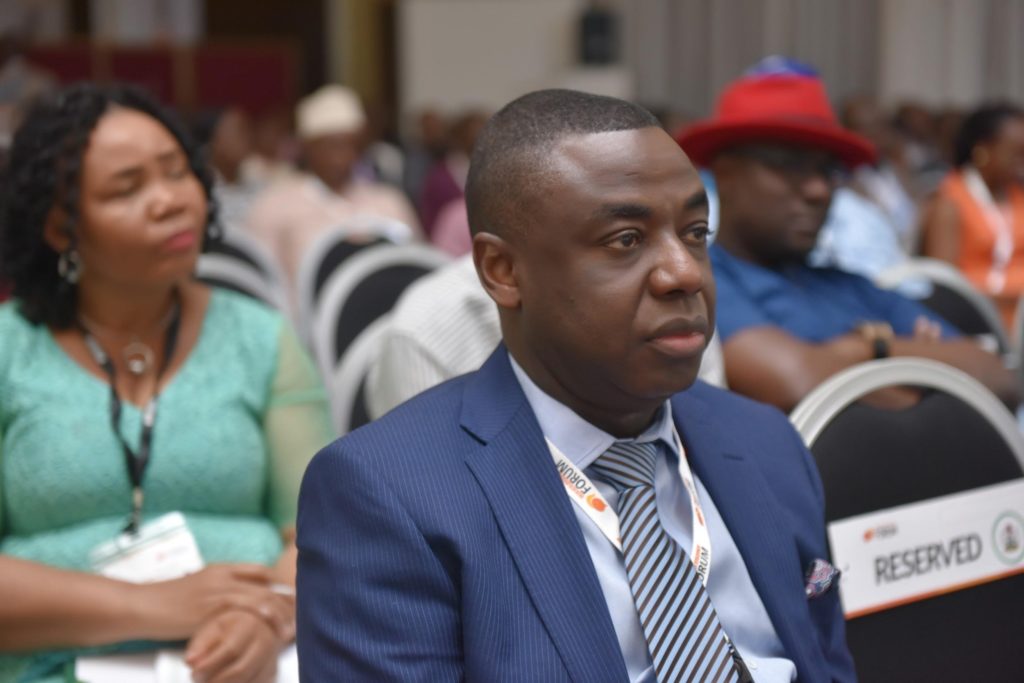
PIND Deputy Executive Director Tunji Idowu listens in on a session at NDDF 2017 in Uyo, Akwa Ibom State
For PIND’s Deputy Executive Director Tunji Idowu, the 2017 edition of NDDF was special. While he had been to NDDF before, this one had him neck-deep in planning to make it happen. Here, he shares his experience and hopes for the future of the region.
This year’s NDDF was quite the experience, both in the planning and execution. The Executive Director Dr. Dara Akala has seen this all many times before, but this is my first time working so directly with the PIND team and other development partners to make it happen. I can tell you this for free: it is a huge ask getting government people from across all nine states in the Niger Delta and federal level to pause their work and convene with their counterparts to plan for the future of their states and the region at large. It took a lot of visits, phone calls, working through our on-the-ground contacts and development partners to make it happen.
One thing you learn when you’re taking on an endeavor as daunting as the NDDF – especially this year’s edition — is that having convening power is hugely important. Over the years, PIND has built this ability in the Niger Delta by being a dependable partner in regional development. States and regional entities alike know who we are, and this has immeasurable value. This year’s NDDF was also just a month after the Nigerian Economic Summit, in which PIND led the Summit’s first ever session specifically on development of the Niger Delta to make a case for investment in the region’s development. We, in turn, were able to streamline the recommendations made from the Summit into this event and bring to a Niger Delta audience. In this way, it is fair to say NDDF has grown because PIND has grown, and our ability to facilitate certain kinds of conversations, get certain kinds of commitments from key actors, has also grown.
Before the event, I confess to having some concerns about interest on the part of some of the state governments. Would they even come? If they came, how active would they be as participants? Would they engage meaningfully with the panel sessions and discussants? Would they actually take on the challenge before them, speak candidly and plan for the future of their states, while learning from other states’ experiences?
I am pleased to say that I need not have worried.
Most of the state government officials who were present gave me considerable hope for the future of the region. They demonstrated vast local knowledge, and focused the conversation with the private sector panelists and moderators so that it kept their states’ needs in view. While not everyone present was uniformly engaged in the task at hand, there were a lot of people who truly know their people and how best to help them. This deepened my belief that the most important thing that every state – and the entire region, by extension – needs is good and effective leadership to chart the course and use resources optimally.
The objective of the Forum, of course, was not just to show up. It was to put collective goodwill behind state-level plans that we come up with together and drive for their implementation in our various levels. This is because these plans are not just plans we came up with for the fun of it; these plans hold the keys to better infrastructure in our states, more sustainable economic growth, improved agricultural outcomes, better education for our people.
My hope that states will take development planning seriously is not without basis. We are currently working with Cross River State Government on their 30-year Growth and Development Strategy, have worked on an investment readiness report for Ondo State Government to help them determine where to direct their energies for economic development, and are working with Nigerian Economic Summit to engage state governments on economic development policy recommendations. In 2018, PIND is also working with Ford Foundation on a pilot of the Niger Delta Youth Employment Pathways Project to develop skills of youth in Akwa Ibom, Rivers and Abia based on the demands of industries in these states.
The future is bright for the region, but nothing will happen without states understanding the hugely important role they play in shaping the direction of our country. I came away from NDDF believing that they get it. Hopefully those who attended can convey the same conviction to others back home in the respective states. The real work starts after the Forum and if the states sustain the kind of enthusiasm that we saw at the Forum, then it means we can work with them to accomplish a lot. And there is plenty to do to turn things around in the region..



